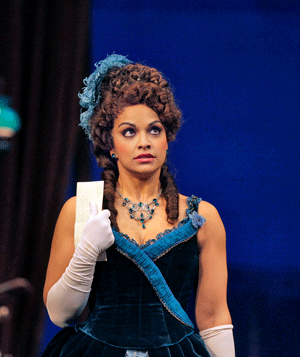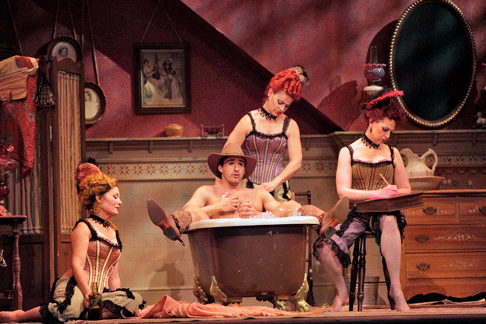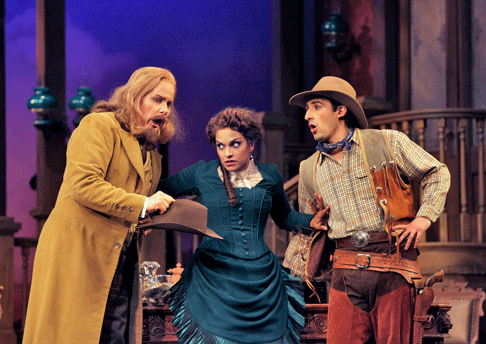So here it is once
again at San Diego Opera in its “spaghetti western” guise —
the David Gately production that the opera company premiered in 2002. Happily
for the opera company’s patrons it signals the end of their mourning
period for poor, demented Salome and for the unfortunate crew in
Moby-Dick. There’s nothing but rollicking operatic fun ahead for
them.
 Danielle de Niese as Norina
Danielle de Niese as Norina
Not having previously seen this production, the Western “shtick”
promotions for the work – ladies in corsets and cowboys in bubble baths —
stirred old puritanical impulses and elicited my deepest fears. Of course
transpositions of time and place are common in opera productions. In fact it
happened to this very opera, Don Pasquale, just a few years after its
1843 premiere at the Italian Theater in Paris. Donizetti and his librettist
Giovanni Ruffini had set the work in contemporary time. “But,” says
the old Grove Dictionary of Music, “the singers and audiences
considered there was a little absurdity in prima donna, baritone and
basso wearing the dress of every day life; and it was usual for the sake of
picturesqueness in costume to put back the time of the incidents to the 18th
century.”
I needn’t have worried about sinful excess. As in that early Don
Pasquale, picturesqueness in costume and sets is primarily what this
clever production is about. Six-guns and horses notwithstanding, the most
admirable element of Gately’s production is the restraint he showed in
not allowing wild West gags and horseplay to overpower the essential
commedia dell’ arte formula at the heart of this opera
buffa.
 Charles Castronovo as Ernesto
Charles Castronovo as Ernesto
Don Pasquale was the last of the great opera buffas. At
the heart of all of them were fairly formulaic commedia
dell’arte plots, acted out by stock characters, behaving in
satisfyingly predictable ways. There was usually a rich, old miser, a wily
“dottore”, a shrewder-than-everyone servant. One or two of these
had to be a bass or a baritone, who would likely sing a dizzying patter song.
There were young lovers kept apart by some multifarious plot. She might be a
soprano or a mezzo-soprano, but he most likely was a tenor. The plots were
generally filled with intrigue involving love affairs, money, inheritances,
mistaken identity and the like. It made no difference how complicated the
machinations of the first two acts were. By the end of the third act everything
will have worked out perfectly and audience and characters went home happy.
In Don Pasquale, miserly rich old Pasquale plans to marry Norina, a
young and beautiful woman, who loves a young and penniless man, Ernesto,
Pasquale’s nephew. Norina and Ernesto scheme with a wily dottore, Dr.
Malatesta, to outwit Pasquale. Pasquale schemes with the same wily Dr.
Malatesta to outwit Norina and Ernesto. Confusion. Who’s doing what with
whom and where? But fear not! Don Pasquale is fooled into letting Norina go.
Norina ends up with the Ernesto. Ernesto ends up with both Norina and Don
Pasquale’s money. What could be better? The great music with it.
Donizetti had an enormous gift for melody from the coloratura of emotional
highs to lyrical, love-lorn laments. And better still, he wrote humor into his
music – rollicking, rhythmic, playful music that can get you bouncing in your
seat.
 Jeff Mattsey as Dr. Malatesta, Danielle de Niese as Norina and Charles Castronovo as Ernesto
Jeff Mattsey as Dr. Malatesta, Danielle de Niese as Norina and Charles Castronovo as Ernesto
San Diego Opera was fortunate to have bass-baritone John Del Carlo as Don
Pasquale. At this time in his career, Del Carlo is the very essence of Don
Pasquale. His ringing voice and skilled acting allow us to see both the humor
and pathos of the man. Tenor Charles Castronovo sang Ernesto, the young man in
love with Norina, whom Pasquale wants to marry. Castronovo, whose sweet
legato singing is always a pleasure, swaggered about appropriately in
cowboy hat, chaps and boots. But I still can’t shake my recollection of
him as the postman in Cat·n’s Il Postino. Lyric soprano Danielle
de Niese, who recently performed the role of Ariel in the Met’s new
The Enchanted Island, made her San Diego Opera debut in the role
Norina. She’s one of the new wave of slim, young, athletic sopranos with
lovely voices, who can sing bel canto arias while sitting, standing,
lying down, or leaping from bed to chair. Baritone Jeff Mattsey in the role Dr.
Malatesta, didn’t seem quite warmed up in the first act, but got his
voice in the saddle by the second. His “cheti, cheti” with Del
Carlo delighted the audience. Marco Guidarini, making his conducting debut with
the company, led an uneven performance. There were some lovely passages and
some sprightly playing, but there were moments when the orchestra lacked the
vivacity with which the singers were performing. The chorus sang its one big
number splendidly.
There is spaghetti served and eaten in this opera, but that’s not
where the term “spaghetti western” comes from. If you don’t
know its origin, look it up. It adds an interesting twist to the production.
Estelle Gilson
image=http://www.operatoday.com/DPSD1136.gif
image_description=Danielle de Niese as Norina and John Del Carlo as Don Pasquale [Photo by Ken Howard courtesy of San Diego Opera]
product=yes
product_title=Gaetano Donizetti: Don Pasquale
product_by=Don Pasquale: John Del Carlo; Dr. Malatesta: Jeff Mattsey; Ernesto: Charles Castronovo; Norina: Danielle de Niese; Notary: David Marshman; Hop Sing: Robert Dahey; Conductor: Marco Guidarini Director: David Gately. Costume Designer: Helen E. Rodgers. Lighting Designer: Harry Frehner. Chorus Master: Charles F. Prestinari.
product_id=Above: Danielle de Niese as Norina and John Del Carlo as Don Pasquale
Photos by Ken Howard courtesy of San Diego Opera